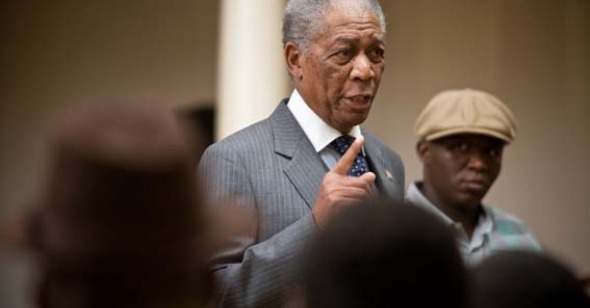Ready, Set, Heal
by Michael Koresky
Invictus
Dir. Clint Eastwood, U.S., Warner Bros.
Clint Eastwood, who deals in a variety of subjects yet often gives his films recognizable authorial stamps, would seem to be prime evidence of the strength of auteurism: the dulcet-toned romantic weepie The Bridges of Madison County feels as much like an “Eastwood film” as the shadowy political thriller Absolute Power or the boxing tragedy Million Dollar Baby. Yet in recent years, Eastwood’s films have begun to seem like they were made by committee, even the almost parodically self-mythologizing Gran Torino, which appeared as though it might have plausibly been half-directed by a second unit crew (anytime the Hmong kids were onscreen sans Clint, the visual quality and the charisma level of the amateur performers plummeted to shocking depths). Changeling, on the other hand, came across as an overblown, unpleasant B-picture that, despite its Eastwood hallmarks—a handful of simple descending chords as its main musical score; somber, envelopingly grim atmosphere; themes of profound systemic corruption—felt alarmingly like a director-for-hire project.
Unfortunately, Invictus continues this trend. It’s the kind of film made with such unerring capital-P professionalism and that’s based on such noble subject matter that it’s all but assured respectful reviews, especially factoring in the general free pass Eastwood’s been given of late (people seem so pleased and surprised of his tireless work ethic at his old age that they overlook the muddled storytelling of Changeling and the infantile martyrdom narrative of Gran Torino), but it’s a thudding, impersonal work. Eastwood is infinitely better at the micro level, constructing narratives out of intimate situations, in which characters relate to one another in constricted settings: Madison County, Million Dollar Baby, and Letters from Iwo Jima are tightly wound and intensely humane, their power coming from human interaction. And in those cases where his films have managed to persuade despite more grandiose statement-making (the nature of revenge in Unforgiven; the legacy of parental abuse in A Perfect World), it’s because the situations buffering them have been given time to play out at a believably human pace. It’s the small moments between people one remembers in his films, not the monumental social or political ideas behind them.
Invictus is all grandiose and symbolic, a large-scale, sweeping narrative of historical change that talks big, but ends up not saying much beyond platitudes. Its screenplay, by Anthony Peckham, is dutiful rather than insightful, and, accordingly, Eastwood’s direction is resolutely by the numbers. In portraying the struggles of the early presidency of Nelson Mandela (Morgan Freeman) via a dramatization of the 1995 Rugby World Cup tournament that’s widely viewed as an important first step in South Africa’s racial healing and emergence on the international stage, Invictus is a mix of biopic and sports movie, yet it doesn’t feel fully invested in either genre. In this case, the triumph of the big climactic game has more than usual at stake: nothing less than the future of a nation trying to crawl out of the shadow of apartheid. Yet Eastwood doesn’t allow any of this to register as more than glib movie mechanics, so tied down is his film to conventional Hollywood grammar and so perfunctory is his depiction of Mandela himself, played by Freeman as an uncomplicated Christ figure.
“He’s not a saint, he’s a man,” one of Mandela’s guards insists early on, and it’s a welcome sentiment that the film chooses not to wrestle with. Rather than investigate what could bring a man so wronged by life to choose forgiveness, peace, and reconciliation, Invictus looks at the political maneuvers it takes to make change possible—this is a fascinating topic for a film, and potentially sobering rebuke to political idealism, but in diverting its attention so completely to sports movie clichés it loses the man at its center. Mandela becomes a noble abstraction, especially compared to the film’s other, earthier protagonist, Francois Pienaar (Matt Damon), the captain of the Springboks, the loser-turned-underdog Rugby team that Mandela hopes will unite his country in spirit. Once the narrative pieces are all set in place, Invictus trudges along to its inevitable end, hitting all the expected points: Pienaar’s white parents sit around the TV criticizing Mandela (in fact that’s all they seem to do) while their maid quietly seethes; Mandela reiterates that “this is the time to build our nation!” over and over again to different skeptical audiences; Pienaar and his teammates exercise and train for the big event.
If Invictus is neither successful as portraiture nor rousing sports movie (when the big game finally arrives, it’s shot and edited in a way that further confuses those who might not know the sport) it’s largely because it’s compassionate without being passionate. Not only is there a certain directorial anonymity to the entire endeavor, but also Eastwood occasionally doesn’t seem to completely grasp the potential power and pitfalls of his own imagemaking. The most glaring example of this comes in a scene late in the film that ranks with the worst of his career. As the players prep on the field, suddenly we cut to the inside of a jet liner’s cockpit. The co-pilot, a steely-faced Caucasian with a seeming chip on his shoulder, is given momentary control of the plane, after which he says with a slight ominousness, “I take full responsibility for what happens.” Suddenly he’s descending, bearing down on the packed stadium; Mandela’s security team looks up in helpless panic: the plane is heading for them. At the last minute, the plane tilts upwards and over the field, its underside painted with a good luck message. A sigh of relief. A film about peace and reconciliation that preys on our fears of terrorism? Even if based on true events, this utterly phony sore-thumb scene is shot and edited for maximum 9/11 exploitation potential, and it betrays a director possibly not in full thematic control of all his moving parts.
